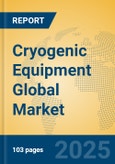Market Size and Growth Forecast
The global cryogenic equipment market is projected to reach between USD 15 billion and USD 20 billion in 2025, with a compound annual growth rate (CAGR) of 5% to 10% through 2030, reflecting the increasing adoption of clean energy technologies and the growing industrial demand for cryogenic applications.Regional Analysis
North America: The United States leads with advanced LNG infrastructure and substantial shale gas production capabilities, while Canada focuses on expanding LNG export facilities and developing hydrogen production capabilities for clean energy applications.Europe: Germany, France, and the United Kingdom dominate the region, driven by energy security initiatives, LNG import infrastructure development, and aggressive decarbonization policies supporting clean energy adoption.
Asia Pacific: China and India demonstrate rapid growth due to expanding industrial infrastructure and increasing LNG imports for energy security, while Japan emphasizes hydrogen economy development and advanced cryogenic technologies for industrial applications.
Rest of the World: Brazil enhances cryogenic capabilities through natural gas infrastructure development, while the Middle East, particularly Qatar and UAE, invests in massive LNG production and export facilities supporting global energy transition.
Application Analysis
Oil & Gas: Expected growth of 6.0-11.0%, driven by expanding LNG production, transportation, and regasification infrastructure. Trends focus on floating LNG facilities, small-scale LNG applications, and hydrogen transport systems supporting energy transition initiatives.Metallurgy: Projected growth of 5.5-9.5%, linked to steel production, metal processing, and advanced manufacturing requirements. Developments emphasize energy efficiency, environmental compliance, and specialized heat treatment applications for high-performance materials.
Automotive: Anticipated growth of 7.0-12.0%, driven by alternative fuel vehicle development and hydrogen fuel cell applications. Advances highlight lightweight cryogenic storage systems, refueling infrastructure, and safety systems for commercial vehicle applications.
Food & Beverage: Expected growth of 4.5-8.5%, tied to food preservation, processing efficiency, and quality enhancement. Trends prioritize sustainable freezing technologies, energy efficiency improvements, and automated processing systems.
Chemical: Projected growth of 5.0-9.0%, supporting industrial gas production, chemical separation processes, and specialty chemical manufacturing. Developments focus on process optimization, energy recovery systems, and environmental compliance solutions.
Type Analysis
Tanks: Expected growth of 6.0-10.5%, valued for storage and transportation capabilities. Trends focus on advanced insulation technologies, modular designs, and enhanced safety systems for various industrial applications.Valves: Projected growth of 5.5-9.5%, essential for system control and safety. Advances highlight smart valve technologies, improved sealing materials, and automated control systems ensuring operational reliability.
Pumps: Anticipated growth of 6.5-10.0%, crucial for fluid handling and circulation. Developments prioritize energy efficiency, reduced maintenance requirements, and enhanced performance in extreme temperature conditions.
Vaporizers: Expected growth of 5.0-9.0%, important for phase conversion processes. Trends emphasize heat exchanger optimization, energy recovery capabilities, and precise temperature control systems.
Vacuum Jacket Piping (VJP): Projected growth of 7.0-11.0%, vital for insulated distribution networks. Advances highlight improved insulation materials, flexible installation options, and reduced heat loss performance.
Key Market Players
Leading firms include Chart Industries, providing comprehensive cryogenic solutions and engineered systems; Linde, offering industrial gases and cryogenic equipment globally; Air Liquide, specializing in gas technologies and cryogenic applications; Herose GmbH, manufacturing specialized cryogenic valves and safety systems; INOX India Limited, producing cryogenic tanks and industrial gas equipment; Nikkiso, developing advanced cryogenic pumps and systems; Wessington Cryogenics, focusing on specialized cryogenic vessels; Braunschweiger Flammenfilter GmbH, providing safety and filtration solutions; Standex International, manufacturing heat exchangers and thermal solutions; Premier Cryogenics, offering custom cryogenic solutions; SAS Cryo Pur, specializing in industrial gas equipment; Lapesa Grupo Empresarial, producing pressure vessels and cryogenic tanks; MAN Energy Solutions, providing industrial process solutions; Cryolor, focusing on cryogenic transport equipment; Galileo Technologies, developing compressed and liquefied gas solutions; and Ulvac Technologies, offering vacuum and cryogenic technologies. These companies drive market growth through technological innovations, strategic partnerships, and expansion into emerging applications.Porter's Five Forces Analysis
Threat of New Entrants: Moderate, due to high capital requirements, specialized technical expertise, and stringent safety regulations, though niche players can enter with innovative technologies or specialized applications.Threat of Substitutes: Low to moderate, as cryogenic equipment serves essential functions in industrial processes, though alternative technologies may emerge for specific applications such as compressed gas storage systems.
Bargaining Power of Buyers: Moderate, with large industrial customers and energy companies seeking cost-effective, reliable solutions while maintaining safety standards and operational efficiency requirements.
Bargaining Power of Suppliers: Low to moderate, due to multiple component suppliers, material providers, and specialized technology companies, though critical components may create some supplier concentration.
Competitive Rivalry: Moderate to high, with companies competing on technology performance, safety records, cost-effectiveness, and comprehensive service capabilities while building long-term customer relationships.
Market Opportunities and Challenges
Opportunities: The global energy transition toward cleaner fuels drives substantial demand for LNG infrastructure, with over 800 million tons of LNG traded annually and growing rapidly as countries phase out coal. The emerging hydrogen economy presents significant opportunities, with hydrogen production expected to increase dramatically as governments invest in clean energy infrastructure. Technological advances in carbon capture and storage create new applications for cryogenic equipment in environmental solutions. The expanding space industry and growing demand for medical applications, including vaccine storage and medical oxygen systems, offer additional growth potential. Industrial gas consumption continues rising with manufacturing growth, particularly in developing economies.Challenges: High capital costs and complex installation requirements limit adoption in some markets and create barriers for smaller companies. Stringent safety regulations and compliance requirements increase operational complexity and costs for manufacturers and users. Volatile commodity prices and economic uncertainties affect investment decisions in large-scale cryogenic projects. Technical challenges in handling extremely low temperatures require specialized expertise and continuous maintenance. Environmental concerns about methane emissions and energy consumption drive demand for more efficient and sustainable cryogenic technologies. Supply chain complexities and long lead times for specialized components can impact project timelines and costs.
This product will be delivered within 1-3 business days.
Table of Contents
Companies Mentioned
- Chart Industries
- Linde
- Air Liquide
- Herose GmbH
- INOX India Limited
- Nikkiso
- Wessington Cryogenics
- Braunschweiger Flammenfilter GmbH
- Standex International
- Premier Cryogenics
- SAS Cryo Pur
- Lapesa Grupo Empresarial
- MAN Energy Solutions
- Cryolor
- Galileo Technologies
- Ulvac Technologies








